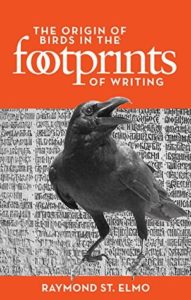
The Origin of Birds in the Footprints of Writing is certainly not my standard fare, but I picked it up as a change of pace between heavier fantasy epics, and it served the purpose quite well. Raymond St. Elmo is heavily influenced by magical realism, which makes it a little more difficult for me to review—I’m not as familiar with the beats of magical realism, so I was sometimes unsure of when to suspend my disbelief—but the story worked well.
We follow Clarence St. Claire, who begins by taking a job with the NSA and being asked to translate a 300-page manuscript of bird tracks. He translates it, having a bit of a mental breakdown along the way, and is promptly fired. Fast-forward ten years, and he’s an anti-social programmer, trying very hard to mind his own business, when the manuscript suddenly comes back into his life. Chaos ensues.
St. Elmo does excellent work portraying the lead as a bit of a jerk, but as endearing at the same time. It’s a hard balance to walk—often the character either becomes entirely unlikable or their flaws are overlooked and excused—but it comes off well here. The office scenes in which Clarence wrangles a recalcitrant program or tries to deal with coworkers encroaching on what he sees as his personal space are an unexpected delight. It’s fun to see through his eyes, even when we see that his eyes are wrong (and sometimes as he sees that his eyes are wrong).
The magical realism elements come in and out (which is, as I understand, what magical realism tends to do), and it generally works well, but there is an extended dream sequence in the third quarter of the book that runs a little long for my taste. It reminds me a bit of the latter portion of The Man Who Was Thursday, where the tether with reality begins to fray, and the story gets wilder and wilder. I didn’t love it when Chesterton did it, and I don’t love it here. If you enjoyed it there, you’ll likely enjoy it here. But regardless of your feelings about dreams, the story pulls back together at the end to give a charming conclusion to a delightfully human story. It’s light, and it’s fun, and it was great to read between a pair of chunkier and/or heavier epics.
Recommended if you like: odes to magical realism, socially awkward protagonists learning about life.
Overall rating: 14 of Tar Vol’s 20. Four stars on Goodreads.
